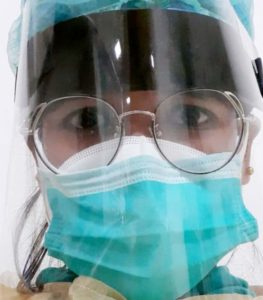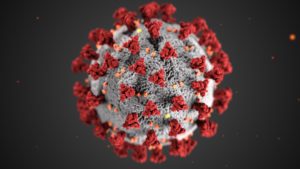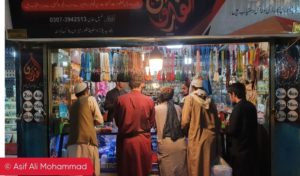Asad Gokal

Persecution of the Shia community in Pakistan is a well known fact. At the onset of Muharram, the community was to face enforced disappearances by the state and hate-based activities by the banned outfits responsible for killing thousands of Shias. The pandemic added another layer to the threats, against which the Shias were to prepare.
The first month of the Islamic Calendar – Muharram is commemorated by Shia Muslims all over the world. Gatherings are held to grieve the merciless martyrdom of Imam Hussain (as). Mourners gather in huge numbers to hear the narration of events in Karbala, eulogies are also recited. Governments are generally supportive when it comes to this important Islamic ritual.
However unfortunately in Pakistan, as the Muharram of 2020 approached, victimization of the Shia sect saw an instant spike. COVID-19 already posed a threat to both – human lives and the scope of Azadari, in addition to which the Shia community was to ward off sinister possibilities of an extremist outlash.
The Shias have been unfortunate in a way that they have found the state against them while facing a wave of persecution against the community. They endured illegal abductions and disappearance for years, without court trials.
In 2020, just a week before Muharram, four Shia activists from Parachinar (Khyber Pakhtunkhwa) were abducted. In Karachi, the family members of Shia missing persons protested outside Governor House on August 16th against the enforced disappearances and demanded a release but to no avail. While prisoners across the world were being released before time in response to increased uncertainty and life risk created by the spread of coronavirus, the families of Shia missing persons were left yearning for their loved ones.

On August 15th, a traffic policeman Syed Muhammad Ali (Shia by faith) was shot dead in Karimabad, Karachi which was suspected to be a sectarian attack by the police. Another notification released by the office of DIG KPK displayed the names of more than 20 police officers who were on the hit list because of their faith. According to the notification, the outlawed outfit, ASWJ (Ahle Sunnat Wal Jamaat) formerly known as Sipah-e-Sahaba Pakistan, had constituted a “Target Killing Squad” to carry out the assassination.

In the days that followed many of the officers whose names were on the list received threat calls from unknown numbers, asking them to either leave or stop practicing their faith else they must be prepared for death.
ASWJ held a public rally in Shahdadpur, a district of Sindh, just a few days before Muharram in which they warned the Sindh government to make sure no Sabeel stalls are set up by Shias in Muharram. The “Shia infidels” slogans were also chanted in the rally.
The same banned group took out rallies across Pakistan on the 1st Muharram. In Karachi, their rally passed through Numaish Chowrangi, a crowded area where a large number of Shia mourners were engaged in the Muharram. Nine years ago, on this day, two Shia scouts were shot dead in the line of duty, by ASWJ’s members.
Although the banned outfit claims to commemorate the day of martyrdom of Hazrat Umar, the second Muslim caliph, Sunni historians and scholars fail to find any authentic narration for it. In fact, some of the sunni scholars have also called it a fabrication by the extremist group to disrupt Muharram proceedings for Shias.

A Barelvi Sunni cleric, Qari Zawar Bahadur, in a conference held against the arrest of blasphemer Ashraf Jalali openly threatened that he would block all Muharram proceedings if Jalali’s release is not made before Muharram. For years, peaceful processions have been targeted by extremists.
In 2009, a devastating blast in the Ashur procession in Karachi killed more than 45 people. The next year, on the day of Arbaeen, twin blasts erupted in Karachi causing more than 25 Shia families to lose their loved ones. The first blast occurred in a bus carrying mourners to the procession whereas the second blast occurred in the hospital where the victims of the first blasts were being treated. The hate and violence directed towards Shias push them deeper into the persecution they are already facing in Pakistan.
This year the organizers face an additional challenge in the form of COVID-19. They are to ensure that all the participants and procession routes are thoroughly checked for any suspected activity/device. Moreover, the scouts and leaders are also to make sure the mourners maintain social distance and act in accordance with the SOPs issued by the Government of Pakistan.

Assistant District Commissioner (ADC) for the Open District scouts and Vice President for Buturab Scouts Group, Syed Muhammad Mehdi, spoke about the challenges they faced. “Just like doctors, scouts are frontline workers in the fight against COVID-19”, said Syed Mehdi. “When the outbreak erupted, our scouts rendered their services to the quarantine center set up at Karachi’s Expo Center and distributed masks in different hospitals as well. It found no recognition though”
Mr. Mehdi made mention of the financial implications. “The scouts have to thoroughly body search all the participants physically in order to prevent any untoward accident to happen, but this has increased their chances of contracting the virus. So we provided complete kits, sanitizers and gloves to the hundreds of scouts performing their duties. The Government did not provide us with any of the safety gears which added to the financial burden”, he further explained,
The head of almost all the scouts in the city also informed about the manner in which these young boys would be ensuring compliance with SOPs during the congregations and processions. In spite of that, the Shia community expects criticism on their activities as the blame for the spread of the virus was slapped onto them. And little good can be expected from the bigoted and stereotypical approach towards the Shia community in Pakistan.
Original content published in partnership with CREID by Ravadar



